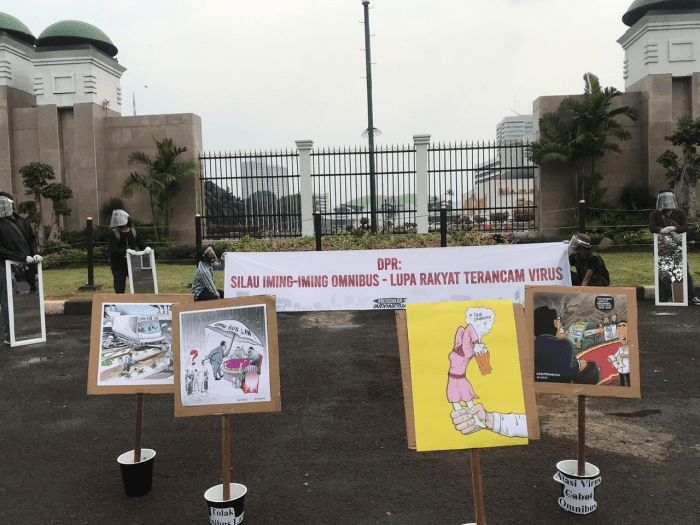During a pandemic, a government should protect its people, not corporations.
Sadly, the Indonesian government appears to move in a different direction. A landmark bill in the country, the Omnibus Bill, aims to boost job opportunities at the expense of the environment and marginalized communities.

Jakarta, Indonesia, 14 July 2020 – Activists in face masks and face shields protested in front of the parliament to express their opposition to the Omnibus Bill.
The Omnibus Bill seeks to deregulate 77 policies in relation to investment in Indonesia into a single law to make the country more appealing to investors. Since its conception, the bill has had major flaws, and concerned citizens and activists have sounded the alarm many times over. No proper consultation took place, nor did the government permit public participation.
According to Sisilia Dewi, 350 Indonesia Team Leader, this bill will be dangerous once enacted because “it lays down a red carpet for investors to extract natural resources with very minimal requirements to obtain permits, no criminal sanction for environmental violations, and more limited public participation.”
“Moreover, it introduces a new provision that the environmental impact assessment will be conducted by a commission arranged by the proposing corporations. The potential for conflict of interest is huge and it further opens opportunities for corruption. The bill curtails our chance to tackle the climate crisis and build resilience,” Sisil said.
The enactment of this bill will jeopardize Indonesia’s environment and put its citizens’ social protection at risk given that the standards of regulations for protection will be weakened. Indonesian environmental and social safeguards will be below par compared to the accepted global standards for financing sustainable development.
Civil society groups published an open letter to warn international financial institutions and investors about how the current policies and regulations in Indonesia are not in line with global standards of environmental and social protection.
The controversial Mining Law
Last May, the Indonesian Parliament passed a mining bill that set forth significant changes to the country’s Coal and Mineral Mining Law of 2009. Those changes – largely in line with mining rules under the proposed Omnibus Bill – seek to streamline the issuance of environmental permits, grant legal certainty for mining giants, boost downstream industry development, and expand the country’s mining territory into the open seas.
People protested through many platforms, but their voices remain unheard.
Indonesia’s new mining law gives the mining industry more power to easily conduct business with less environmental obligations. We certainly do not need laws like this esp while grappling with the impacts of COVID19 & the climate crisis. pic.twitter.com/Ph21HceJdm
— 350 East Asia (@350EastAsia) July 16, 2020
A Just Recovery for all
We’ve seen how the pandemic has exposed the deep inequities of our existing system — and left us with an opportunity to leave these injustices behind once and for all. This is not the time to profit from this crisis. Just Recovery measures must protect all people, but especially the most vulnerable communities, by addressing the interconnected crises we face, including the climate breakdown.
We have a chance to once again have our voices heard: The G20 countries, which includes Indonesia, will be meeting this week to discuss plans to recover from the present crises we’re facing. Together, let’s demand justice and a dignified, livable future for all. Business as usual wasn’t working in the first place, and we don’t need laws that will make us go back to the way things were.
What you can do now
Tell the G20 leaders that you want Just Recovery measures for better jobs and investment in our communities, healthcare, housing, social care, and dignified livelihoods.